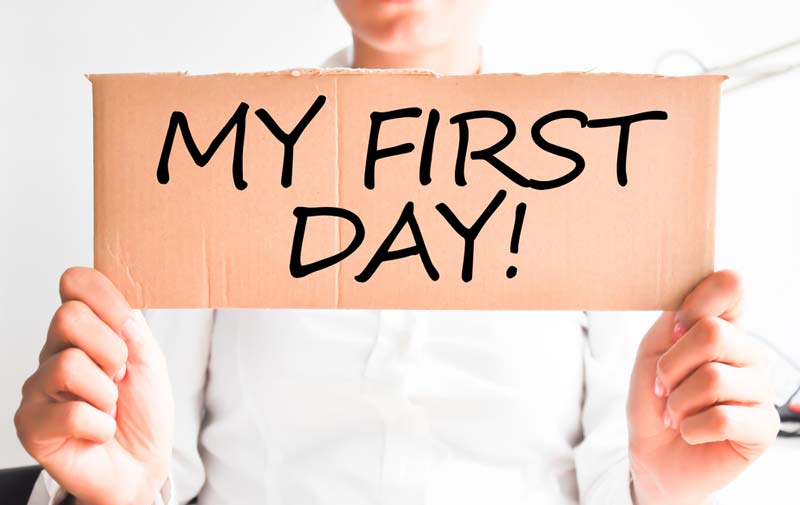Starting a new job can always seem daunting, nerve racking and also exciting. But you should relax and take in all the new experiences and get to know the people you’ll be working with. Your first week will be all about introductions and training for the new role, so there is a lot less pressure on you than you think.
Remember to not panic and realise that everyone else in the company had to have a first day also, and will have felt the same as you. Here’s what to expect during your first day and week in your new job.
“Starting a new job can be nerve-racking , but it’s also exciting. You’re embarking on a new future, positioning yourself to write a fresh story on a clean slate.” ~ Adena Friedman
Meeting the boss
On your first day you’ll usually be greeted by your manager who will also have been present during your interview. It’s always nice to see a familiar face when you’re nervous and anxious, so it’s quite common for whoever conducted your interview to be the first to greet you and make you feel comfortable.
Sometimes your manager might be in a meeting when you arrive so it’s not uncommon for one of your team members or supervisors to greet you and show you around the office until your manager is free to speak with you.
Tip – memorise your manager’s name as well as any others that were present in the interview and that you are likely to be working with. It will save you any embarrassment and will make a great first impression.
Introductions and greetings
After your initial greeting you will usually be shown around the place of work meeting various people along the way. Depending on the layout of the building you will usually be taken to meet your team first, and then shown around the facilities which could include the toilets, the kitchen and dining area, the café and so on.
A manager will usually like to give you a brief overview of the company structure and show you the other departments, so you can begin to get a grasp of how everything fits together and functions alongside your department. Sometimes you will also be introduced to managers higher up than your own, especially if you are working for a large company with many levels of management.
“Every single job is a challenge. You are walking into a new set, a new character, creating a world and trying to get comfortable to do your best work.” ~ Felicia Day
The paperwork
The Human Resources department will require lots of information from you, like your bank details for your wage, your identification for their records, contact information, and so on. A really important document is your P45 which must be given to your new employer so they can accurately calculate your wages.
You should typically be provided with a contract of employment which you should check through and sign. Everything that was discussed and agreed upon before you were hired should be confirmed within this contract. If you have any questions you should raise them as soon as possible, and certainly before you sign it. Mistakes can be made, so it’s important they are amended quickly.
Induction and training
Most companies have a training program and induction that you will be taken through. On your first day it will likely be an overview of what the company does and what your role will be, along with your probation period, how you’ll be appraised, and what your targets/goals are and how you can achieve them.
Your probationary period may be anything from 1 month to 1 year, but typically 3-6 months is the most common. During this period you will be assessed on your performance to ensure you are the right person for the job. This time will also allow you to assess your own performance and decide whether or not this is right for you.
“I still get the jitters every time I start a new job! I love it—makes you feel alive.” ~ Camille Guaty
Health and safety information
It’s the employer’s responsibility to ensure the health and safety of all its employees, so you will likely be taken through some kind of health and safety training during your first day. Depending on the role, this may be more important if you will be coming into contact with tools or machinery which can be dangerous if not operated properly and within the guidelines set by the company.
Apart from the training you will receive before using any equipment, some of the more standard things you should know are where the fire exits are, where the first aid kit is, and where the designated meeting point is if the fire alarm goes off or if you need to evacuate the building for any reason.
